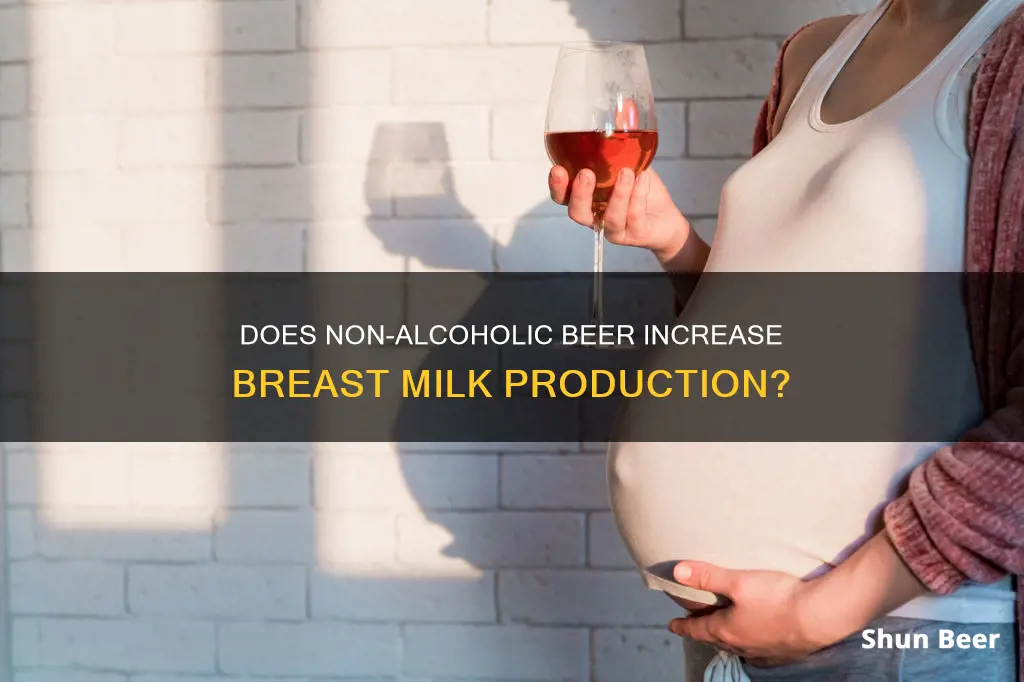
There is a long-held belief that drinking beer can increase a mother's breast milk supply. This idea has been encouraged in many cultures for centuries, with records showing that beer has been prescribed as a milk-boosting agent as far back as 2000 BC. In modern times, low-alcohol beer has been specifically marketed in the United States to lactating women.
The belief that beer increases breast milk supply is based on the fact that malted barley, a common ingredient in beer, has been shown to affect the secretion of prolactin, one of the hormones responsible for milk production. However, multiple studies have found that alcohol consumption can inhibit milk production and letdown, even in small amounts. For example, one study found that breastfed infants consumed 20-23% less milk in the first four hours after their mothers drank an alcoholic beverage.
So, while the ingredients in beer may have some galactagogue effects, the presence of alcohol suppresses these benefits. It is important to note that the negative effects of moderate alcohol intake on breast milk are short-lived, and supply levels return to normal once the alcohol has left the mother's system.
| Characteristics | Values |
|---|---|
| Alcohol-free beer boosts breast milk supply | True |
| Alcohol-free beer tastes good | True |
| Alcohol-free beer increases serum prolactin levels | True |
| Alcohol-free beer increases antioxidant capacity of milk | True |
| Alcohol-free beer has negligible alcohol levels in milk | True |
| Alcohol decreases milk production | True |
| Alcohol inhibits the milk ejection reflex | True |
| Alcohol in breast milk can affect baby's sleep patterns | True |
| Alcohol in breast milk can affect baby's growth and development | True |
| Alcohol can pass into breast milk | True |
What You'll Learn
- Barley in beer may increase prolactin, a hormone that helps with milk production
- Alcohol in beer may decrease milk supply and inhibit the milk ejection reflex
- Non-alcoholic beer may increase the antioxidant capacity of breast milk
- Drinking alcohol while breastfeeding may negatively impact a baby's sleep patterns and growth/development
- Drinking non-alcoholic beer while breastfeeding is unlikely to affect the baby

Barley in beer may increase prolactin, a hormone that helps with milk production
It is a widely held belief that beer can help increase breast milk supply. In fact, for centuries, women have been drinking beer in hopes of making more milk. This belief has some basis in science. Beer can stimulate prolactin secretion, which may enhance lactogenesis in non-lactating humans and experimental animals. Prolactin is a hormone responsible for initiating lactation in women.
The component in beer responsible for the effect on prolactin secretion is not the alcohol content but a polysaccharide from barley. This explains why non-alcoholic beer also has the same effect. Studies have shown that when non-breastfeeding women were given beer, their levels of prolactin in their blood rose.
However, it is important to note that alcohol decreases milk production and inhibits the milk ejection reflex. Therefore, any benefit of increased prolactin from drinking beer is counteracted by the amount of alcohol in the beer. Studies have shown that infants consumed significantly less milk during the testing sessions when their mothers drank alcoholic beer compared to when they drank non-alcoholic beer.
Therefore, while barley in beer may increase prolactin, a hormone that helps with milk production, the presence of alcohol in the beer suppresses milk production.
Beer and Hepatitis B: What You Need to Know
You may want to see also

Alcohol in beer may decrease milk supply and inhibit the milk ejection reflex
While non-alcoholic beer may be a good option for breastfeeding mothers who want to enjoy a drink, it's important to understand the potential impact of alcohol on milk supply and the milk ejection reflex.
Alcohol in beer can decrease milk supply and inhibit the milk ejection reflex, known as "let-down". This reflex is essential for the release of milk during breastfeeding. Research has shown that even a small amount of alcohol can cause a temporary but significant decrease in milk supply. This is because alcohol suppresses the release of oxytocin, the "feel-good" hormone that plays a crucial role in the let-down reflex.
Multiple studies have found that breastfeeding infants consumed less milk after their mothers drank alcoholic beer compared to non-alcoholic beer. In one study, infants consumed 23% less milk after their mothers had just one alcoholic beer. Another study found that nursing mothers who drank alcoholic beer produced 9.3% less milk two hours later compared to when they drank a non-alcoholic beverage.
The inhibitory effect of alcohol on milk supply and the milk ejection reflex is likely due to its impact on hormone levels. Alcohol decreases the secretion of prolactin, a hormone responsible for initiating lactation. Additionally, it suppresses the release of oxytocin, which is necessary for the let-down reflex.
It's important to note that the negative effects of moderate alcohol intake on breast milk are usually short-lived. Once the alcohol is metabolised, milk supply and the milk ejection reflex typically return to normal. However, excessive alcohol consumption can have more lasting impacts on milk supply and infant development.
Minors and Non-Alcoholic Beer: Is It Safe?
You may want to see also

Non-alcoholic beer may increase the antioxidant capacity of breast milk
It has been suggested that non-alcoholic beer may increase the antioxidant capacity of breast milk. This claim is supported by a study which found that nursing mothers who supplemented their diets with non-alcoholic beer had higher levels of antioxidants in their breast milk. The study involved 23 Taiwanese nursing mothers who consumed a chicken-based soup with and without alcohol during the first 15 days postpartum. The results showed that the mothers who consumed the alcoholic soup had higher levels of antioxidants in their breast milk, as well as higher levels of triacylglycerol and lactate.
Another study, conducted by Codoñer-Franch et al. (2013), found that diet supplementation with non-alcoholic beer during early lactation increased the antioxidant properties of breast milk and reduced oxidative damage in breastfeeding mothers. The study involved 40 breastfeeding mothers who were randomly assigned to two groups: the intervention group, who consumed 660 ml of non-alcoholic beer daily, and the control group, who did not consume any beer. The results showed that the mothers who consumed non-alcoholic beer had higher levels of coenzyme Q10 in their breast milk after 30 days, indicating increased antioxidant capacity.
The potential benefits of non-alcoholic beer for breastfeeding mothers are not limited to its antioxidant properties. Some experts suggest that the barley and hops present in non-alcoholic beer can stimulate the secretion of prolactin, a hormone that plays a crucial role in milk production. This claim is supported by studies which found that beer, including non-alcoholic beer, can increase prolactin levels in both humans and experimental animals. However, it is important to note that the presence of alcohol may counteract these benefits by suppressing milk production.
While the potential benefits of non-alcoholic beer for breastfeeding mothers are promising, more research is needed to fully understand its effects. The studies mentioned above had small sample sizes and focused primarily on the short-term effects of non-alcoholic beer consumption. Additionally, the potential long-term effects of non-alcoholic beer on the health and development of infants are still unknown. Therefore, while non-alcoholic beer may offer some benefits for breastfeeding mothers, it should be consumed in moderation and in consultation with a healthcare professional.
Beer and Cirrhosis: What You Need to Know
You may want to see also

Drinking alcohol while breastfeeding may negatively impact a baby's sleep patterns and growth/development
While non-alcoholic beer may boost a mother's breast milk supply, drinking alcohol while breastfeeding may negatively impact a baby's sleep patterns and growth/development.
Alcohol can pass from the mother's bloodstream into breast milk and, subsequently, into the baby when they feed. While an occasional drink is unlikely to harm the baby, regular drinking above the recommended limits can be harmful to both mother and child. Excessive alcohol consumption can decrease milk supply and cause sleep, growth, and developmental problems in the baby.
Research has shown that babies exposed to alcohol through breast milk experience sleep disturbances, including shorter sleep periods, more frequent wakefulness, and less total active and REM sleep. A study by Mennella and Garcia-Gomez found that when a mother consumed a significant amount of alcohol, her infant's sleep was disrupted for up to 24 hours after exposure. This is because the infant needs to make up for the earlier disruption to their sleep pattern.
In addition to sleep disturbances, alcohol consumption by the breastfeeding mother can also lead to decreased milk intake and weight gain in the baby. A study by Mennella et al. found that infants consumed approximately 20% less breast milk in the first four hours after their mothers consumed alcohol, despite spending a similar amount of time on the breast. This is due to the inhibitory effect of alcohol on the milk ejection reflex.
Furthermore, there may be potential long-term effects on the baby's development. A 2018 study showed that 6- and 7-year-old children who had been exposed to alcohol in their mother's milk as babies scored lower on reasoning tests compared to children who had not been exposed. Another review by Nonacs showed that regular exposure to alcohol in breast milk was associated with decreased or delayed motor development in infants.
Therefore, it is important for breastfeeding mothers to limit their alcohol intake and follow guidelines provided by healthcare organizations to minimize any potential negative impacts on their baby's sleep patterns and growth/development.
Drinking Beer in Public in London: What's the Law?
You may want to see also

Drinking non-alcoholic beer while breastfeeding is unlikely to affect the baby
Non-alcoholic beer is made by removing the alcohol from regular beer, and it typically contains less than 0.5% alcohol by volume. It is generally considered safe for breastfeeding mothers to consume in moderation, and it may even offer some benefits. For example, some studies have shown that drinking non-alcoholic beer can increase the antioxidant capacity of breast milk and enhance the mother's plasma.
However, it is important to note that the effects of drinking non-alcoholic beer while breastfeeding are not well-studied, and there is limited research on the topic. While it is unlikely to cause harm to the baby, it is always advisable for breastfeeding mothers to consult with a healthcare professional before consuming any alcoholic or non-alcoholic beverage.
It is worth noting that while non-alcoholic beer may not have a significant impact on the baby, it can still have effects on the mother's health and well-being. As with any beverage, it is important to consume non-alcoholic beer in moderation and be mindful of the potential impact on overall health and wellness.
Cats and Beer: A Curious Combination
You may want to see also
Frequently asked questions
Drinking non-alcoholic beer while breastfeeding is considered safe, as the alcohol levels in breast milk are negligible. However, it's important to note that even small amounts of alcohol can cause a temporary decrease in milk supply.
While non-alcoholic beer doesn't contain alcohol, it does contain other components like barley and hops, which are known to stimulate prolactin secretion and may enhance breast milk production. However, there is limited scientific evidence to support this claim, and more research is needed.
It is recommended to drink non-alcoholic beer in moderation while breastfeeding. Excessive consumption may have short-term effects on milk supply and can also affect the taste of the milk.
Yes, non-alcoholic beer can provide some additional benefits for breastfeeding mothers. It can increase the antioxidant capacity of breast milk and may also have a relaxing effect due to the presence of hops.







